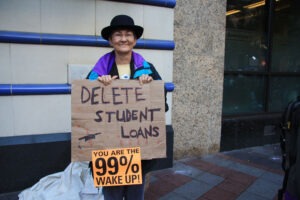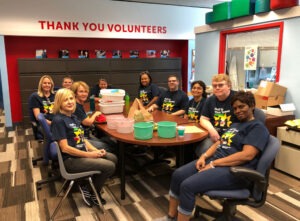
Earlier this month, NPQ detailed the near-impossibility of receiving student loan forgiveness. If you are one of thousands of borrowers denied student loan forgiveness under the federal student loan forgiveness program, never fear; a new social enterprise has entered the market with a mission to eliminate the financial hurdles that prevent borrowers from giving back to their communities. Founded by three physicians, the Shared Harvest Fund (SHF) was created to couple the act of volunteering with student loan repayment.
The founders assert that people saddled with student loan debt are often unable to spare time for volunteering. When a disproportionate amount of personal income is directed toward student loans, people may feel pressured to take on “side hustles” to make payments. SHF seeks to take advantage of the growing gig economy by differentiating itself as a more “mindful hustle” than popular gigs like Uber and Lyft. By participating in the Shared Harvest Fund’s program, people are able to pay down student loans, experience the health benefits of volunteering, and gain satisfaction from contributing to social causes.
The concept of volunteering in exchange for student loan assistance is not new. Federal programs such as the Peace Corps and AmeriCorps are some of the largest programs offering such incentives. However, unlike those programs, which require a year or more of full-time service, the Shared Harvest Fund is intended to be used by busy professionals. The platform offers a variety of short- and long-term projects and even the option to volunteer remotely.
The “Harvest Model” breaks its partners down into “debtfreelancers” (current students or professionals), “changemakers” (nonprofit organizations seeking assistance), and “harvesters” (companies looking to offer student loan benefits to employees or meet corporate social responsibility goals through sponsorships). Additionally, the program allows friends and family to assist in lowering participants’ student loan debt through sponsorships. Sponsors can volunteer for projects and donate their stipends to designated debtfreelancers.
Sign up for our free newsletters
Subscribe to NPQ's newsletters to have our top stories delivered directly to your inbox.
By signing up, you agree to our privacy policy and terms of use, and to receive messages from NPQ and our partners.
To set-up a profile page on SHF’s Impact Job Board, debtfreelancers are charged a $25 subscription fee. In exchange for completed service projects, the Shared Harvest Fund makes a direct payment to a volunteer’s student loan lender. Typical projects earn between $250-$1,000 in credits and debtfreelancers are free to complete an unlimited number of projects. However, they can only receive a maximum of $5,000 per year. Eventually, the organization intends to expand programming to include networking events, financial education courses, and discounts from business partners.
The founders of the Shared Harvest Fund might just be on to something. According to the Federal Reserve, the student loan crisis is expected to worsen, with cumulative debt inching towards $1.5 trillion this year. At the same time, volunteerism has been on a steady decline for more than a decade. With more than 20 percent of federal student loan borrowers behind on payments and many more struggling to pay, the volunteer gig economy may be enticing to people, especially those under the age of 30, who are burdened with higher student loan debt and are more likely to rate volunteerism as a very important civic obligation. Furthermore, the fact that individuals with higher levels of education are more likely to volunteer makes the potential for a boost in volunteerism more likely.
The most recent statistics from the Bureau of Labor Statistics show that “among the major race and ethnicity groups, Whites continued to volunteer at a higher rate (26.4 percent) than Blacks (19.3 percent), Asians (17.9 percent), and Hispanics [sic] (15.5 percent).” A program seeking to reduce student loan debt through volunteerism could also indirectly diversify the country’s volunteer base by race and class. Research released by The Institute for College Access & Success (TICAS), found that certain subsets of college graduates struggle to pay their student loans: first-generation college students, Pell Grant recipients, bachelor’s degree holders who were Black, and students who attended for-profit colleges are more likely to default on student loans.
While the concept of merging volunteering and ameliorating student loan debt is an innovative idea, the feasibility of taking the concept to scale in a way that truly benefits both parties may take time to develop. A reliance on project-based volunteering would require organizations to shift to offering more remote or episodic volunteering opportunities. For the Shared Harvest Fund, the difficulty lies in balancing the number of subscribers to projects available.—Chelsea Dennis













